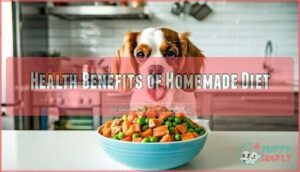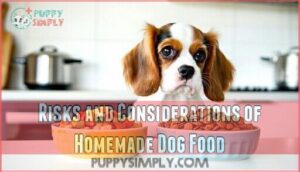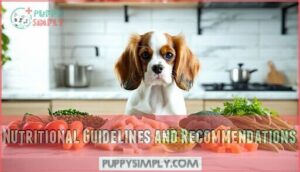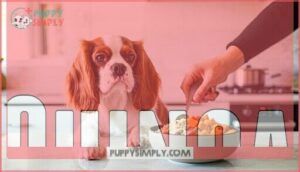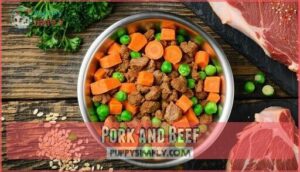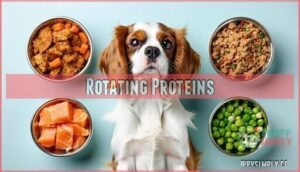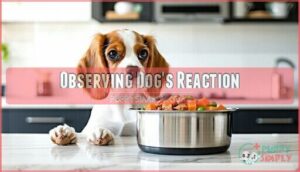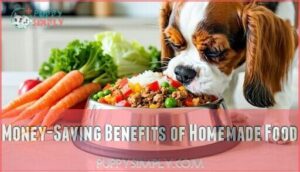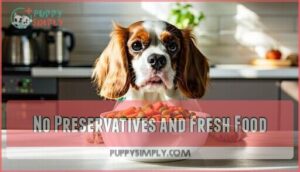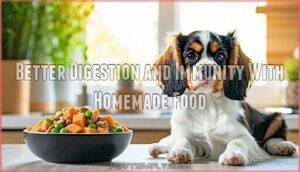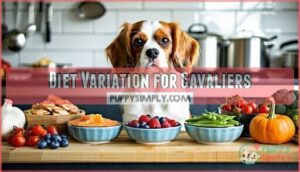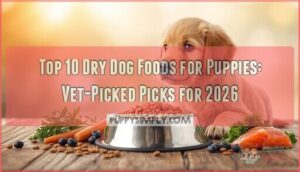This site is supported by our readers. We may earn a commission, at no cost to you, if you purchase through links.
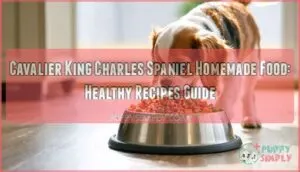
You’ll know exactly what ingredients go into each meal, avoiding questionable additives found in commercial foods. This breed-specific approach helps manage Cavaliers’ heart conditions by controlling sodium levels and supports healthy weight management.
Fresh proteins like chicken, turkey, and fish combined with vegetables and grains create balanced meals suited to your dog’s needs. You can rotate ingredients to prevent allergies while ensuring proper nutrition.
Homemade food often costs less than premium commercial options and typically improves digestion and coat quality. The key lies in understanding proper nutrient ratios and safe ingredient combinations.
Table Of Contents
- Key Takeaways
- Benefits of Homemade Diet for Cavaliers
- Health Benefits of Homemade Diet
- Risks and Considerations of Homemade Dog Food
- Nutritional Guidelines and Recommendations
- Alternative Proteins for Cavaliers
- Importance of Trusted Ingredients and Regulation
- Money-Saving Benefits of Homemade Food
- No Preservatives and Fresh Food
- Better Digestion and Immunity With Homemade Food
- Diet Variation for Cavaliers
- Frequently Asked Questions (FAQs)
- What do vets recommend for homemade dog food?
- Can Cavalier King Charles eat rice?
- Can King Charles cavaliers eat carrots?
- How often should I feed my Cavalier homemade food?
- Can I freeze homemade dog food batches?
- What kitchen equipment do I need for preparation?
- How do I transition from commercial to homemade?
- Should I cook vegetables or serve them raw?
- Conclusion
Key Takeaways
- You’ll gain complete control over your Cavalier’s nutrition by preparing homemade meals, allowing you to avoid questionable additives, manage sodium levels for heart health, and tailor portions to prevent obesity-related joint issues.
- Homemade food typically costs 30-40% less than premium commercial options while providing superior ingredient quality, with monthly expenses ranging from $25-45 versus $40-80 for store-bought food.
- You must consult a veterinary nutritionist before switching to ensure proper calcium-phosphorus ratios, adequate protein levels (18-25%), and essential supplements like omega-3s to prevent nutritional deficiencies.
- Fresh ingredients without preservatives improve your Cavalier’s digestion and immunity by supporting beneficial gut bacteria, reducing inflammation, and eliminating artificial chemicals that stress the liver and kidneys.
Benefits of Homemade Diet for Cavaliers
When you prepare homemade meals for your Cavalier King Charles Spaniel, you gain complete control over every ingredient that goes into their bowl.
This approach allows you to guarantee quality, manage costs, and tailor portions specifically to meet your dog’s unique dietary needs, ensuring a tailored approach to their nutrition.
Quality Control
When you prepare homemade dog food for your Cavalier King Charles, you control every ingredient that enters their bowl.
When you cook for your Cavalier, you’re their personal chef creating meals with love and intention.
This hands-on approach to ingredient sourcing guarantees recipe accuracy and maintains strict quality control standards.
Proper preparation methods and storage practices protect your dog’s nutritional balance while eliminating concerns about commercial food additives.
Key quality control benefits include:
- Complete ingredient transparency – You know exactly what goes into each meal
- Fresh preparation methods – No preservatives or artificial additives compromise nutrition
- Consistent nutritional testing – Monitor your cavalier king charles spaniel’s health response to homemade dog food
Through careful attention to dog nutrition principles, you create meals that meet your pet’s specific dietary needs while maintaining the highest safety standards.
Affordability
Looking beyond commercial dog food costs, homemade meals for your Cavalier King Charles offer significant DIY savings through smart ingredient sourcing and batch cooking strategies.
You’ll control long-term costs while ensuring cost-effectiveness through precise portion control.
| Cost Factor | Commercial Food | Homemade Food |
|---|---|---|
| Monthly Expense | $40-80 | $25-45 |
| Ingredient Quality | Variable | Premium controlled |
| Portion Flexibility | Fixed sizes | Custom portions |
Money-saving becomes effortless when you purchase ingredients in bulk and prepare weekly batches.
Dog food recipes using affordable proteins like ground turkey stretch your budget further while meeting your Cavalier’s nutritional needs perfectly, ensuring cost-effectiveness and allowing for precise portion control with custom portions and premium controlled ingredient quality.
Portion Size Control
While saving money matters, controlling portions becomes your secret weapon for keeping your Cavalier King Charles Spaniel healthy.
You’ll need food scales to measure weight-based portions accurately since these small dogs require precise calorie density calculations. Monitor your dog’s weight weekly and adjust portions based on their activity levels.
Cavaliers with high metabolic rates need careful portion control to prevent hypoglycemia while avoiding overfeeding. Understanding your dog’s specific calorie requirements helps you create the perfect balance.
Weight management becomes straightforward when you’re measuring every meal instead of guessing portions like you might with commercial kibble. Some owners opt for premium brands like Blue Buffalo dog food to guarantee high-quality ingredients.
Fresh Ingredients
When crafting Cavalier King Charles Spaniel homemade recipes, fresh ingredients become your foundation for nutritional excellence.
Seasonal produce from local markets offers peak vitamins while organic options eliminate harmful pesticides that could affect your pet’s sensitive system.
- Ingredient sourcing makes certain you select the highest-quality proteins, vegetables, and grains
- Dietary fiber from fresh vegetables supports your Cavalier’s digestive health naturally
- Homemade treats using fresh components provide better nutrition than processed alternatives
Fresh ingredients in homemade meals deliver superior taste and nutritional value your Cavalier deserves.
Dietary Requirements Met
Meeting your Cavalier’s nutritional needs becomes straightforward when you control every ingredient.
Homemade spaniel diet allows you to achieve perfect nutrient balance while addressing breed specifics like heart health requirements. You’ll provide prime calorie density for your dog’s size and energy levels.
Consider these key advantages:
- Balanced meals with precise vitamins and minerals ratios
- Supplement needs customized to your Cavalier’s health profile
- Veterinary guidance integration for complete nutritional needs
This personalized approach guarantees your furry friend receives exactly what their body requires, avoiding commercial food’s guesswork and potential allergens.
Health Benefits of Homemade Diet
When you prepare homemade meals for your Cavalier King Charles Spaniel, you’re taking a proactive step toward preventing common health issues that affect this beloved breed.
Studies show that balanced homemade diets can reduce the risk of obesity, which affects up to 48% of Cavaliers, while also supporting heart health and managing breed-specific conditions like mitral valve disease.
Prevention of Health Issues
A properly planned homemade spaniel diet acts as your Cavalier’s shield against common health problems.
Toxic food avoidance and maintaining the right calcium phosphorus ratio protect against serious complications, while supplementing homemade meals with essential nutrients supports heart health and joint health.
Your vet-approved recipes can prevent food allergies and skin disorder prevention becomes achievable through:
- Calorie dense meals that maintain healthy weight
- Nutrient-rich ingredients that boost immunity naturally
- Balanced formulations that support long-term wellness
Breed-specific Health Problems
Cavaliers face unique challenges that homemade diets can help address.
These gentle companions are genetically predisposed to several serious conditions requiring targeted nutritional support.
| Health Condition | Nutritional Support |
|---|---|
| Mitral Valve Disease | Low-sodium, heart-healthy omega-3s |
| Syringomyelia | Anti-inflammatory fish oil supplements |
| Hip Dysplasia & Patellar Luxation | Joint-supporting glucosamine, weight control |
| Eye Issues | Antioxidant-rich vegetables, vitamin A |
Vet-approved recipes let you control sodium levels for heart health while providing joint-supporting nutrients.
Senior dog nutrition becomes essential as breed-specific health problems develop.
You’ll create meals that support your Cavalier’s unique needs rather than relying on generic commercial formulas.
Increased Lifespan
Beyond addressing breed-specific health problems, you can substantially boost your Cavalier’s longevity through proper nutrition.
Homemade food provides nutritional advantages that support increased lifespan by up to 20%.
Key longevity factors include:
- Preventative care through balanced, preservative-free meals
- Exercise benefits from sustained energy levels
- Mental stimulation via varied, appealing recipes
- Genetic influence optimization with breed-appropriate nutrition
This approach counters health issues prevention while maximizing your dog’s potential lifespan.
Saint Bernards, for example, benefit from homemade food that addresses their unique nutritional needs.
Allergy Prevention
Homemade diets offer powerful allergy prevention for your Cavalier through careful Ingredient Elimination and Limited Ingredients approaches.
You’ll control every component, avoiding common triggers like corn, wheat, or specific proteins that cause dog food allergies.
This targeted strategy supports Gut Health and Immune Support while reducing food sensitivities.
Novel Proteins like duck or venison can replace problematic ingredients, creating practically hypoallergenic dog food.
You’ll notice fewer allergy symptoms like itching or digestive upset when problematic ingredients are removed.
| Common Allergens | Safe Alternatives | Benefits |
|---|---|---|
| Corn, wheat, soy | Sweet potato, rice | Better digestion |
| Chicken, beef | Duck, venison, fish | Reduced skin issues |
| Artificial additives | Natural ingredients | Less inflammation |
| Dairy products | Coconut oil, fish oil | Improved coat health |
Obesity and Joint Health
Your Cavalier’s predisposition to weight gain makes calorie control through homemade meals a game-changer for preventing obesity-related joint issues.
You’ll have complete control over portion sizes and can incorporate targeted joint supplements like glucosamine and chondroitin directly into their food.
Weight management becomes simpler when you know exactly what goes into each meal, supporting your dog’s mobility and reducing strain on developing joints.
- Monitor Daily Calories: Track your Cavalier’s caloric intake based on their activity level and age to prevent excess weight that stresses joints and reduces mobility support effectiveness.
Risks and Considerations of Homemade Dog Food
While homemade diets offer many benefits for your Cavalier, they can create nutritional imbalances if you don’t formulate them carefully.
Research shows that improper calcium-to-phosphorus ratios and missing essential nutrients like taurine can lead to serious health problems, making veterinary guidance vital for your dog’s safety.
Potential Pitfalls
While homemade diets offer wonderful benefits, you’ll want to sidestep these common mistakes that can harm your Cavalier’s health.
Many well-intentioned pet parents stumble into these traps without realizing the long-term effects on their furry companion.
Watch out for these potential pitfalls:
- Nutrient Imbalance – Missing essential vitamins or minerals your Cavalier needs
- Toxic Ingredients – Accidentally including toxic foods like onions or grapes
- Recipe Inadequacy – Using incomplete formulas lacking balanced nutrition
- Bacterial Contamination – Improper food handling creating safety risks
- Missing Calcium Sources – Forgetting bone-building nutrients for skeletal health
- Skipping Vet Consultation – Avoiding professional guidance on nutritional supplements
Research Findings
Research reveals concerning gaps in homemade dog food preparation that directly impact your Cavalier’s health.
Studies show most owner perceptions about nutritional adequacy don’t match reality.
Key research findings include:
- Nutritional deficiencies: Many homemade diets lack adequate taurine, leading to dilated cardiomyopathy in breeds prone to heart disease
- Recipe inconsistencies: Owners frequently modify recipes without understanding impacts on essential nutrients for mitral valve disease prevention
- Health monitoring gaps: Despite improved energy levels and coat condition, many miss breed-specific health problems developing from inadequate nutrition
Importance of Consulting a Veterinary Nutritionist
With a canine nutritionist consultation, you sidestep common pitfalls like recipe imbalance and dietary deficiencies.
A veterinary nutritionist offers professional guidance, tailoring recipes to your Cavalier’s health conditions and activity level.
Expert formulation guarantees nutritional adequacy, preventing issues from missing nutrients or unsafe ingredients.
Relying on a veterinarian consultation means your dog’s meals meet established standards.
Here’s a quick look at why expert help matters:
| Risk | Expert Solution | Result |
|---|---|---|
| Deficiencies | Recipe balancing | Healthy bones/skin |
| Imbalance | Nutrient calibration | Steady energy |
| Allergies | Ingredient screening | Fewer flare-ups |
| Disease | Ongoing monitoring | Early detection |
| Weight gain | Portion control | Healthy weight |
Nutritional Guidelines and Recommendations
Creating nutritious homemade meals for your Cavalier King Charles Spaniel requires understanding their specific dietary needs and following proven nutritional guidelines.
You’ll need to balance essential nutrients including the right protein levels (18-25%), healthy fats (10-15%), and key supplements to support your spaniel’s heart health and prevent common breed-related issues, such as those related to key supplements.
Essential Nutrients
Understanding what your Cavalier needs nutritionally forms the foundation for creating healthy dog food at home.
Your pup requires six key components: high-quality proteins for muscle development, healthy fats for coat shine, complex carbohydrates for sustained energy, vitamins for immune support, minerals for strong bones, and adequate water for proper organ function.
Protein Quality matters most—lean proteins like chicken and fish provide amino acids without excess fat.
Fat Sources should include omega3 fatty acids from fish oil for skin health.
Mineral Balance supports bone strength, while Vitamin Variety (A C D E Bcomplex) boosts immunity.
Hydration Importance can’t be overstated—fresh water aids digestion and nutrient absorption throughout your dog’s body.
Protein Quality, Fat Sources, and Mineral Balance are crucial for your dog’s overall health, and ensuring they receive the right amount of each is vital for their well-being.
Your dog’s diet should include high-quality proteins and a balance of other essential nutrients to keep them healthy and thriving.
Protein Sources
Your Cavalier needs high-quality protein sources for muscle development and overall health.
Lean proteins like chicken, turkey, and fish provide digestibility while supporting your dog’s energy needs. Novel proteins such as duck and venison can prevent protein allergies when rotating different sources regularly.
For a wider selection, explore different Cavalier protein products.
Consider these protein options for your Cavalier’s homemade meals:
- Chicken and turkey – Budget-friendly lean proteins with excellent digestibility
- Fish varieties – Salmon, sardines provide omega-3 fatty acids for coat health
- Duck and venison – Novel proteins ideal for dogs with sensitivities
- Eggs and yogurt – Complete amino acid profiles with added probiotics
- Beef and lamb – Rotate occasionally to maintain protein variety and prevent allergies
Carbohydrate Sources
Carbohydrates fuel your Cavalier’s energy needs, but choosing the right sources matters for peak health.
Complex carbs provide sustained energy without blood sugar spikes, supporting your pup’s active lifestyle.
- Oats and brown rice offer excellent carb digestibility with moderate glycemic index values
- Sweet potato strips deliver fiber content plus essential vitamins for immune support
- Quinoa provides complete amino acids alongside carbohydrates for muscle maintenance
- Grain-free options like potatoes accommodate dogs with carb sensitivities or allergies
Rolled oats work particularly well for Cavaliers prone to digestive issues, while sweet potatoes add natural sweetness most dogs love.
Importance of Water
Water serves as the foundation of your Cavalier’s health, supporting essential organ function and preventing dehydration-related complications. Fresh water access throughout the day isn’t just recommended—it’s essential for proper digestion and temperature regulation.
| Importance of Water |
|---|
| Promotes Hydration |
| Supports Organ Function |
| Aids in Digestion |
Here are four key hydration strategies:
- Monitor daily intake – Watch for dehydration signs like lethargy or dry gums
- Provide constant fresh water access – Clean bowls prevent bacterial growth
- Include hydration-rich foods – Add a splash of water to meals or offer water-rich vegetables
- Adjust water needs – Increase availability during hot weather or after exercise
Proper hydration benefits extend beyond basic survival, supporting kidney function and nutrient absorption while maintaining your dog’s energy levels.
Recommended Supplements and Calorie Requirements
Proper supplementation and calorie calculation form the foundation of successful homemade feeding.
Your Cavalier’s breed metabolism requires approximately 25-30 calories per pound daily, adjusted for activity levels and senior dog considerations.
Essential supplements include:
- Calcium carbonate or ground eggshells for balanced calcium-phosphorus ratios
- Fish oil with omega-3s for joint health support and coat condition
Supplement timing matters—add calcium to cooked meals, while fish oil can be mixed directly into food.
Some owners buy calcium carbonate products specifically formulated for canine use.
Active dogs need higher calorie counts, while seniors require fewer calories but more joint support.
Veterinary guidance guarantees you’re meeting your dog’s specific needs based on weight, health status, and life stage.
Remember, each Cavalier is unique.
Alternative Proteins for Cavaliers
You’ll want to expand beyond traditional chicken and turkey to keep your Cavalier’s meals interesting and nutritionally complete.
Alternative proteins like quinoa, pork, beef, and fish offer essential amino acids and prevent food sensitivities that can develop from feeding the same protein repeatedly.
Quinoa
Besides adding variety to your Cavalier’s meals, quinoa brings impressive quinoa benefits as a complete protein containing all essential amino acids.
This grain-free dog food alternative supports digestive health with its natural fiber sources while being gentler on sensitive stomachs.
When cooking quinoa, rinse thoroughly and boil until fluffy—it’s that simple.
Watch for quinoa allergies during introduction, though they’re rare. Consider sweet potato alternatives for allergy management if needed.
Pork and Beef
Looking beyond chicken and turkey, pork and beef offer excellent protein alternatives that bring both variety and hearty nutrition to your Cavalier’s homemade meals. These red meats pack essential nutrients like iron, zinc, and B-vitamins while providing high-quality amino acids for muscle development.
Pork Nutrition delivers complete proteins with excellent digestibility, while Beef Benefits include rich iron content supporting healthy blood cells. Choose Lean Options like pork tenderloin or lean ground beef to maintain proper fat levels for your Cavalier’s sensitive digestive system.
Preparation Safety requires cooking these meats to 165°F to eliminate harmful bacteria. Their Breed Suitability works well for most Cavaliers, though you’ll want to monitor for any digestive sensitivities when introducing new proteins.
- Always introduce new proteins gradually over 7-10 days to prevent digestive upset
Recipe Variety expands when incorporating beef and pork, creating more engaging meals. Practice Allergy Watch during shifts, and maintain Digestive Health Monitoring to confirm your Cavalier thrives on these protein sources.
Rotating Proteins
Rotating proteins keeps your Cavalier’s meals interesting while supporting ideal nutritional balance.
Switch between chicken, turkey, fish, and lamb every one to two weeks to provide diverse amino acid profiles and reduce protein allergies risk.
This approach helps prevent food triggers from developing and supports better digestive health.
Watch your dog’s reaction during switches – some pups show taste preferences for certain protein sources.
Gradual switches between proteins minimize stomach upset while maintaining allergy watch protocols.
This strategy dilutes potential allergen exposure and prevents your furry friend from developing sensitivities to specific allergy-causing ingredients over time.
Observing Dog’s Reaction
Vigilant observation becomes your compass when introducing new proteins to your Cavalier’s diet. Appetite Changes often signal your dog’s preference for specific proteins, while maintaining consistent meal enthusiasm indicates acceptance.
Monitor Stool Consistency closely—healthy, firm stools suggest proper digestion, whereas loose or unusual formations may indicate protein intolerance requiring immediate attention.
Your dogs reaction extends beyond basic digestion. Watch for these critical signs:
- Energy Levels fluctuating dramatically after meals, indicating potential food sensitivities
- Coat Condition becoming dull, brittle, or experiencing excessive shedding patterns
- Allergy Signs manifesting as itching, skin redness, or persistent ear infections
- Vomiting diarrhea episodes occurring within hours of protein introduction.
Successful allergy identification requires patience and detailed stool observation. Document each protein trial for at least one week, noting any digestive disruptions.
This systematic approach helps pinpoint specific food triggers, ensuring your Cavalier receives ideal nutrition while avoiding problematic ingredients that compromise their health and comfort.
Importance of Trusted Ingredients and Regulation
Sixty-seven percent of veterinarians recommend human-grade ingredients for your Cavalier’s homemade meals.
When you control ingredient sourcing and guarantee label transparency, you’re protecting your pet from the 42% ingredient substitution found in commercial foods.
Proper regulatory oversight and safety testing eliminate risks from toxic foods for dogs, while ethical production practices support allergen avoidance.
This vet-recommended approach to natural dog food creates safe ingredients your Cavalier needs.
| Quality Factor | Commercial Risk | Homemade Advantage |
|---|---|---|
| Ingredient Accuracy | 42% substitution rate | 100% verified sourcing |
| Contamination Risk | 25-35 recalls yearly | 92% pathogen reduction |
| Allergen Control | Hidden by-products | Complete transparency |
| Safety Testing | Limited oversight | Personal quality control |
| Nutritional Value | Cheap fillers common | Premium ingredients only |
Money-Saving Benefits of Homemade Food
You’ll cut your dog food expenses substantially when you prepare homemade meals for your Cavalier King Charles Spaniel using affordable ingredients like ground turkey, rice, and vegetables.
Commercial premium dog food costs can add up quickly, but batch-cooking weekly portions of nutritious homemade recipes often costs less while providing better quality nutrition for your pet, using ingredients like ground turkey.
Cost-effective Homemade Recipes
Making homemade food doesn’t have to break the bank. Smart ingredient sourcing and batch cooking can slash your costs while providing premium nutrition for your Cavalier.
Recipe customization lets you adapt meals based on seasonal savings and leftover utilization. Many owners also look for affordable dog food options.
- Bulk buying staples like brown rice and ground turkey reduces per-meal expenses
- Seasonal vegetables offer cost-effective recipes while maximizing nutritional value
- Batch preparation streamlines DIY dog food creation, supporting allergen elimination and improved dog digestion
Fresh Ingredients for Health
Beyond cost savings, fresh ingredients deliver superior Nutrient Density compared to processed alternatives.
When you control Ingredient Sourcing, you’re choosing seasonal produce at peak nutrition levels. Recipe Customization becomes effortless when working with Seasonal Produce and Organic Options.
Fresh food naturally supports dog health through vitamins that degrade over time in commercial kibble. Your homemade dog food maintains nutrient integrity, promoting ideal dog wellness through a truly balanced diet, which is a key factor in achieving dog wellness.
Improved Digestion and Immunity
Fresh ingredients do more than just nourish—they actively transform your Cavalier’s gut health.
Homemade meals packed with fiber sources and natural probiotics create a thriving gut microbiome that strengthens immune support.
You’ll notice fewer digestive upsets and improved digestive regularity.
Consider adding enzyme supplements for enhanced gut health improvement, helping your pup’s system process nutrients while supporting natural toxin elimination processes.
No Preservatives and Fresh Food
While saving money on your Cavalier’s diet is appealing, the real game-changer lies in what you’re NOT feeding them. Commercial pet foods often contain preservatives like BHA, BHT, and ethoxyquin that can trigger sensitivities in your sensitive spaniel.
Fresh Nutrition: Homemade pet food delivers nutrients at their peak potency. You’re sourcing ingredients from your local grocery store, not a factory warehouse where vitamins degrade over months of storage.
Ingredient Sourcing: You control every component that touches your dog’s bowl. No mysterious "meat by-products" or artificial colors that serve manufacturers, not your pet.
Preservativefree Benefits: Your Cavalier’s system won’t work overtime processing chemicals it doesn’t recognize. This natural diet approach reduces stress on their liver and kidneys.
Here’s what freshness matters means for your spaniel:
- Reduced Allergens – Fresh proteins and vegetables eliminate common triggers found in processed foods
- Enhanced Flavors – Your picky eater will notice the difference between fresh chicken and kibble "chicken meal"
- Pet Food Safety – You eliminate recalls, contamination risks, and questionable manufacturing practices
Your kitchen becomes your quality control center, ensuring every meal meets your standards. Some dogs may also develop allergies that lead to excessive paw licking, so be mindful of ingredients.
Better Digestion and Immunity With Homemade Food
Homemade food acts like a digestive system makeover for your Cavalier King Charles Spaniel, transforming their gut health from the inside out.
Give your Cavalier’s digestive system the fresh start it deserves – homemade nutrition transforms gut health naturally.
You’ll notice improvements in your dog’s gut microbiome when you switch from processed commercial foods to fresh, whole ingredients that provide natural enzyme support.
| Digestive Benefits | Immune System Benefits |
|---|---|
| Enhanced fiber sources promote healthy gut bacteria | Natural probiotic benefits strengthen disease resistance |
| Reduced inflammation in the digestive tract | Immune system boost from nutrient-dense ingredients |
| Less frequent digestive upset and stomach issues | Better food digestion supports overall wellness |
Fresh ingredients contain natural probiotics that commercial foods often lack after processing.
Your Cavalier’s digestive system will thank you for eliminating artificial preservatives and fillers that can trigger inflammation.
The fiber sources in homemade meals—like sweet potatoes and green beans—feed beneficial bacteria while supporting regular bowel movements.
Pro tip application: Start with easily digestible proteins like chicken or turkey when switching to homemade food.
This gentle approach prevents digestive upset while allowing your dog’s immune system to adapt gradually to the nutrient-rich diet.
Diet Variation for Cavaliers
Your Cavalier’s palate craves adventure just like yours does. Ingredient rotation prevents diet boredom by introducing new proteins weekly – try switching between chicken, turkey, and fish.
Pay attention to your dog’s taste preferences; some Cavaliers favor beef over lamb, while others prefer fish-based meals. Recipe adjustments become essential when incorporating seasonal foods like pumpkin in fall or fresh berries in summer.
For dogs with sensitivities, limited ingredient diets work best initially before expanding variety. Recipe variation keeps mealtimes exciting while ensuring balanced nutrition. Monitor your pup’s enthusiasm at dinner time – their tail wagging tells you everything about their flavor preferences and helps guide future diet variation choices.
Ensuring they get enough essential fatty acids is also critical for their coat and overall health, and can be found in more detail at essential fatty acids, which is vital for a healthy coat and overall health, and supports a balanced nutrition plan with the right diet variation.
Frequently Asked Questions (FAQs)
What do vets recommend for homemade dog food?
Vets typically recommend consulting them before starting any homemade diet to guarantee proper nutritional balance.
They’ll suggest including quality proteins, healthy fats, complex carbohydrates, essential vitamins, minerals, and calcium supplements for complete nutrition.
Can Cavalier King Charles eat rice?
White grains versus brown grains can make all the difference in your pup’s bowl.
Yes, Cavaliers can safely eat rice, especially brown rice, which provides essential complex carbohydrates for sustained energy and healthy digestion in your spaniel’s homemade meals.
Can King Charles cavaliers eat carrots?
Yes, you can absolutely feed carrots to your King Charles Cavalier.
They’re safe, nutritious vegetables that provide vitamins, minerals, and fiber.
Carrots support eye health and immunity while serving as a healthy, low-calorie treat your spaniel will enjoy.
How often should I feed my Cavalier homemade food?
You should feed your homemade food twice daily to maintain stable energy levels. Small breeds like yours need calorie-dense meals to prevent hypoglycemia, so consistent feeding schedules work best.
Can I freeze homemade dog food batches?
Need meal prep flexibility? You can absolutely freeze homemade dog food batches for up to three months.
Portion meals into freezer-safe containers, leaving expansion space.
Thaw overnight in the refrigerator before serving to maintain nutritional quality and safety.
What kitchen equipment do I need for preparation?
You’ll need a food processor or blender for mixing ingredients, a large pot for cooking, sharp knives for chopping vegetables, cutting boards, measuring cups, and freezer-safe containers for batch storage.
How do I transition from commercial to homemade?
Gradually shift over seven to ten days by mixing increasing amounts of homemade food with decreasing commercial food portions. Start with 25% homemade, then 50%, 75%, and finally 100% to avoid digestive upset.
Should I cook vegetables or serve them raw?
Like turning back the clock to simpler times, cooking vegetables breaks down tough fibers, making nutrients more digestible for your pup.
Steam or lightly boil carrots, sweet potatoes, and green beans until tender for maximum nutrition absorption.
Conclusion
Starting cavalier king charles spaniel homemade food transforms your pet’s health like switching from fast food to home cooking.
You’ve learned proper nutrition guidelines, safe ingredients, and cost-effective recipes.
Remember to consult your veterinarian before switching, introduce new foods gradually, and maintain consistent portions.
With careful planning and quality ingredients, you’ll provide your Cavalier with superior nutrition while strengthening your bond through thoughtful meal preparation that supports their unique dietary needs, which is essential for their overall health.

